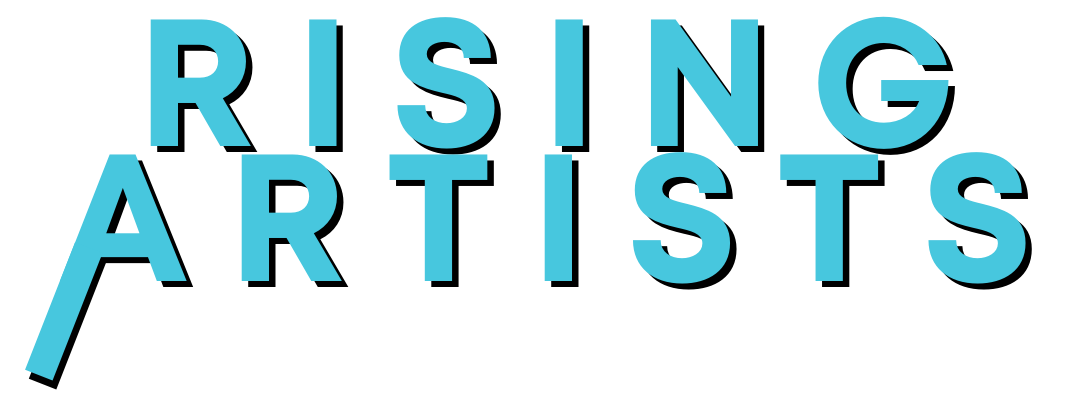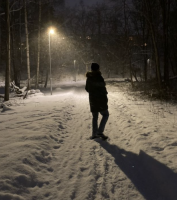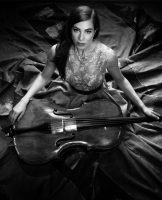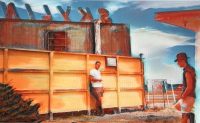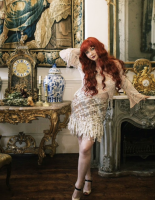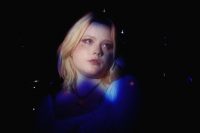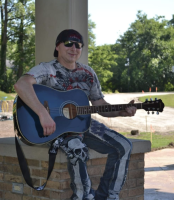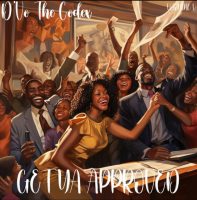Whether you know it or not, you’re probably already a fan of Jon Batiste. In addition to being the director and bandleader for The Late Show with Stephen Colbert, Batiste was the composer for Disney and Pixar’s latest film Soul, a moving musical masterpiece about finding the meaning of life. We were able to attend a conference where Batiste spoke in anticipation of the release of his new album We Are, but first we’d like to take a moment and appreciate a few of the compositions he created for Soul.
Soul is a movie that depends heavily on its jazz soundtrack to tell the story of Joe Gardner, a jazz musician and music teacher looking for his break into the business. “Born to Play” sets the tone with a rhythmic high-hat intro before the jazz band blasts in. Marked by incredible piano and saxophone riffs and syncopated chords, this short, lively tune gets your feet tapping. “Bigger Than Us” is a laid-back composition with a saxophone melody and warm, supportive piano chords that seem to respond to every saxophone statement. A gorgeous waterfall of piano arpeggios adds a classical element to this song as it fades. “Collard Greens and Cornbread Strut” is an upbeat song with heavy horns, dependable percussion, and decorative piano and vocal riffs. In a change of pace, “Joe’s Lowdown Blues” leaves the band behind for a solo piano performance full of dissonance and fluttering notes that tell a sad yet hopeful tale.
The Grammy and Emmy nominated Batiste continues to share his unmatched talent and skills with the release of his upcoming album We Are. During his press conference, the New Orleans-based musician described the album, stating “It’s so expansive in terms of sound. It’s genreless. It’s a novel and, if you close your eyes, it’s a movie”. Based on the expansive range shown in just four songs that he created for the Disney and Pixar film, we can definitely expect We Are to be full of engaging surprises and a whole lot of soul.
Written by Katrina Charles
Press Q&A with Jon Batiste
Q (the NY Press Board): How do you think music can play a role in social advocacy?
Jon: Music changes the way peopleʼs emotions and thoughts happen. It makes it feel communal. You have music at BBQs. You have music at worship services. You have music at funerals. You have music when people are doing all types of ritualistic cultural gatherings throughout the history of time. So I think music has always been a glue, a social glue. And if you get people together and you make people feel the same emotion at the same time, itʼs a lot easier to have nuance conversation and itʼs a lot easier to have dialogue. People have used music in the Civil Rights Movement with Dr. Martin Luther King marching with singers and all the different ways weʼve used music. Itʼs the oldest trick in the book. We just gotta keep going back to the play book.
Q (Juiced Magazine): Outside of being born into a musical family, how do you see your childhood and growing up in Louisiana shape who you are as a person and what youʼve done with music?
Jon: I think growing up in the south, thereʼs a pace to life that is very slow and allows time for you to be reflective. Also, I think growing up in Louisiana in particular, thereʼs so much thatʼs culturally different to many other places in the world. Thereʼs specific types of food. Thereʼs traditions, like Mardi Gras carnival. You look at the architecture and the streets. You got the Spanish areas, the French areas. You got the African influence all over. You have all of these different ways that, subconsciously, youʼre being taught to appreciate culture and appreciate tradition and appreciate community. And then you start to think about life in a certain way even before you can verbalize what that is. The South has a lot of negative stereotypes and it also has a lot of negative realities that have influenced me in the sense of how to view the world and filters to view people that I had to unlearn or I had to be weary of because my safety or my well being may be under attack. And all those things are good too because itʼs just real life. Itʼs a slice of life thatʼs very special. The whole vibe of Louisiana is very unique and that creates a unique perspective in a young person.
Q (The Cultural Reset): How do you feel Black ingenuity and Black creativity is treated in the music industry at this point and has it had an impact on your career?
Jon: From America’s birth, this countryʼs an experiment of cultures coming together and you have indigenous people and Black people at the center of so much that itʼs become undeniable. Whether we like it or not, those of us who are musicians canʼt avoid being influenced by Black music. Those of us who are in culture and are proponents of culture canʼt avoid Black culture. Itʼs a part of the DNA. Itʼs like the air we breathe. And I think that weʼve gone through times where we were reluctant to recognize Black genius but thatʼs different to being influenced by it. And I think the undeniable quality of the culture is something that weʼll always struggle with if weʼre viewing things through the prism of race. And racism is still a part of our mythology.
As far as it impacting me, Iʼve had both the good fortune of being born into a lineage of Black culture and being a leader of Black culture that has given me opportunity to forward it and spread it and innovate. And then Iʼve also dealt with the stereotypical nature of being viewed as a “Black performer”; thus, put in a box based off of someone elseʼs ignorance. Thereʼs ups and downs and at this moment, we have opportunity as weʼve had many times in the past to undergo a great unlearning. But I donʼt necessarily think that it will happen unless people continue to talk about it.
Q (HumanKind Zine): When recording your upcoming album, We Are, in New York, Los Angeles, and New Orleans, how did you try to infuse the essence and influences of each area into each song? Were there any specific details of each place that you tried to make stand out?
Jon: Yes. Itʼs so interesting how as a creative weʼre sensitive to environments and thereʼs almost no choice in how the environment seeps into the work. If Iʼm writing something or if Iʼm playing somewhere, the place that iʼm in and the people that are there or the people who arenʼt there, if Iʼm in solitude, and the history of the place that Iʼm in, the instrument that Iʼm using, and the mic that Iʼm singing into and the shoes that Iʼm dancing in, whatever it is, it goes into the work. Thatʼs why you hear about people who have this special guitar, they have a special place that they go or they have a certain room in the house where they write. Itʼs just inevitable. And I had the pleasure of working with many different musicians and different creatives who brought their energy and their life story to the record that was all very meaningful to me. I did a lot of recording in my dressing room at the Ed Sullivan Theater where we tape the Late Show. My dressing room is the dressing room for the legendary Carol Burnett when she did her show. And I got to meet her and collaborate with her and she told me stories that I didnʼt even know happened in my dressing room. And in the Ed Sullivan Theater thatʼs where the Beatles played, thatʼs where James Brown played, thatʼs where Elvis did the hips dance. I like to believe all of that energy is just there. Itʼs really just there. Thatʼs why you have to choose carefully where you want to capture your material and where you want to create.

Q (HumanKind Zine): In a New York Times article, it says that you had 50 GoPros filming you as you recorded the music for Soul to accurately articulate Joeʼs playing so that the filmmakers could make the playing as authentic as possible. Then in an NPR article, it said that most of your ideas about Jazz were integrated in the film. How do you feel when you saw Joe Gardner in the final product knowing that you were a big reference in creating his character in Pixarʼs first Black lead?
Jon: The first scene really moved me a lot. I wrote the dialogue in that scene and it was improvised. And to see that when I first saw the film was a surprise because I didnʼt know that that would open the movie. And you see how heʼs playing and you see the words too that heʼs saying, and Iʼm like, “Thatʼs so me!” And I was crying cause I just didnʼt know. I had worked on the film for over two years and itʼs something that I knew was going to be very important and have a really powerful spirit to it and it would influence a lot of people and their understanding of Jazz and the sacred lineage of Jazz music. I wanted to give myself to it but to actually see yourself in it was really powerful and itʼs historic to have that as a part of my creative legacy. Itʼs definitely one of my favorite parts of my creative life thus far.
Q (Fan): Is our lifeʼs passions our lifeʼs purpose?
Jon: The thing about passion is we have a built in passion-finding mechanism which is our heart. The heart is there and it looks for things to get wrapped up in and it gives us so many feelings and emotions and things that will motivate us. And thatʼs good, if itʼs placed in the right thing. But, the mind is there to logically process information. The mind lies a lot and so does the heart. When theyʼre out of alignment then the passion leads you astray. The mind is always looking for things to keep you safe so thereʼs a lot of fear sometimes in our minds. And the heart is looking for things to get wrapped up in. So itʼs very easy to be misled by a passion thatʼs not in alignment. So I wouldnʼt say that our passion is our purpose but I would say that it is when weʼre in alignment and thatʼs the work you have to do first.
Q (Post Production Magazine): Your album is coming up called We Are. What can we look forward to from hearing it?
Jon: Itʼs so expansive in terms of sound. Itʼs genreless. I canʼt even put it into a category of music. Itʼs a novel and if you close your eyes, itʼs a movie. And itʼs meant to be listened to like a novel you donʼt skip chapters of. If youʼre open to it, I really do believe you will leave feeling very full every time you listen to it. Itʼs like a 45 minute meditation that you can take every day.
